Modern Guest Expectations: Personalization & Digital Guest Services
Today's guests are digital, demanding, and want to be impressed. Studies from Deloitte and Oracle show:
- 71% of 25-41 year-olds have higher vacation expectations than previous generations
- +30% higher chance of repeat stays if their individual preferences are understood.
- 73.3% of guests expect personalized hotel offers during their stay
Hardly surprising: guests are used to perfectly curated social feeds, apps that predict their needs, and digital experiences that trigger emotions. They don't want to miss this routine during their vacation, especially when they're treating themselves to a well-deserved break.
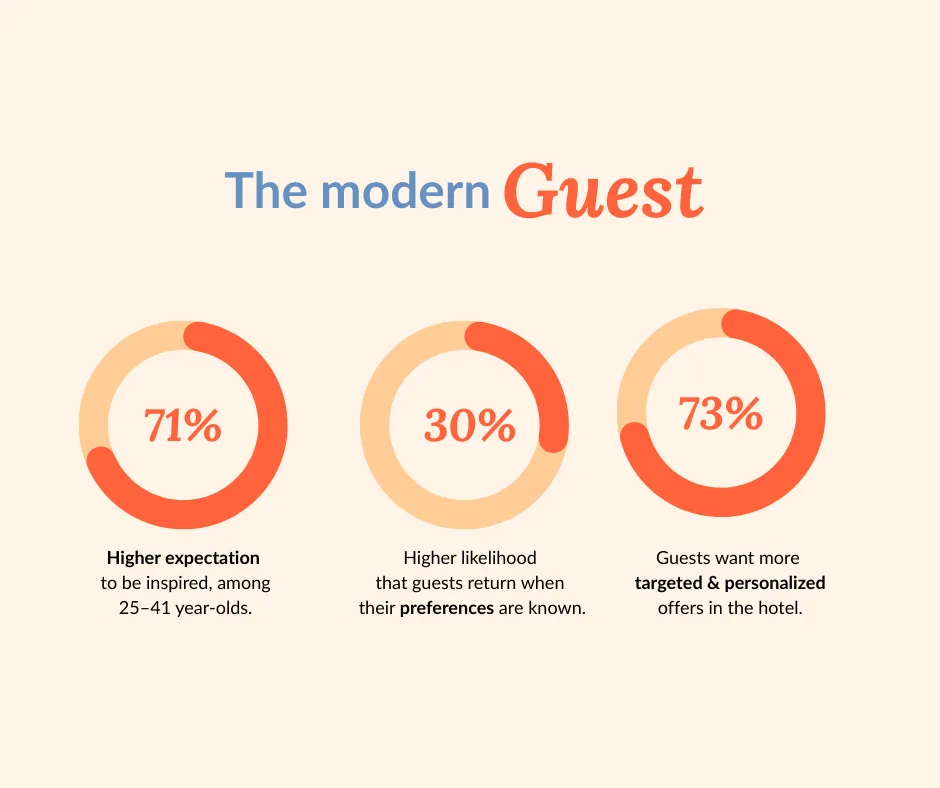
Does Your Hotel Meet Modern Guest Expectations?
From online check-ins to hotel apps: digital guest services are often associated with convenience and process efficiency. But what's frequently missing is what made hotels great in the first place: hospitality.
A simple booking button on a smartphone no longer excites anyone. Guests want more: more personalization, more entertainment, and more experience.
The question isn't whether your hotel is digital, but how you digitally delight guests.
Are you still just informing?
Traditional hotel guest apps stop at informing about additional services: they list hotel offers, but don't inspire guests to use them. Guests must search for suitable offers themselves, click through lists, and are often overwhelmed with information. The result: overwhelmed guests, low usage, and missed revenue opportunities for your hotel.
Why Traditional Digital Guest Services Fail:
- Lack of motivation: Static lists don't create desire to book
- Complicated usage: Multiple clicks and forms make purchasing difficult
- No targeted impulses: Guests remain alone and feel overwhelmed
Guest Activation addresses this gap by using sales psychology to motivate action.
What is Guest Activation? The "Aha-Moment" for More In-Stay Bookings
User Activation comes from digital marketing. It describes the strategic process of turning passive visitors into active users. At its core is the "Aha Moment"—the instant when a guest sees the value of an offer and acts.
You've surely experienced such "aha-moments" yourself: personalized recommendations from Amazon or when Spotify motivates you to upgrade with "Today only: 3 months for $0.99." That's User Activation in action.
Behind this are psychological sales impulses that motivate you to act:
- Social Proof: "10 others booked this today"
- Scarcity: "Only available for 2 more hours"
- FOMO: "Don't miss the last tour"
- Frictionless guest experience: One-click bookings, personalized recommendations
The principle: Many decisions are made unconsciously. Martin Lindstrom describes in "Buyology: Truth and Lies About Why We Buy" how emotions, memories, and embedded stimuli determine whether we buy or not. People rationalize their decision only after the purchase.
While other industries and online platforms like Booking.com achieve great success with User Activation, hotels still communicate largely traditionally and rationally.
A typical scenario: A 5-star hotel offers premium spa treatments, wine tastings, and special experiences. But guests learn about them through crowded bulletin boards at reception, static hotel apps, or generic pre-stay emails. This means: your guests have to work during their vacation to treat themselves.
Guest Activation for the Hotel Industry
Guest Activation transfers proven User Activation principles to hotel operations. Instead of informing guests with digital guest directories or banners, targeted, emotion-awakening sales impulses are created that motivate booking additional services.
The foundation: Create aha-moment → Increase motivation → Trigger action.
| # | Traditional Hotel Apps | Guest Activation |
|---|
| 1 | Information overload | Targeted guest communication |
| 2 | Static lists (don't evoke emotions) | Dynamic, familiar design (creates anticipation & motivation) |
| 3 | Impersonal texts & images | Authentic video messages |
| 4 | Guests must actively search | Guests are proactively inspired to experience more |
| 5 | Reactive waiting: Hotel manager hopes for guest initiative | Proactive control: Hotel manager sets targeted sales impulses for desired action |
How Sales Psychology Activates Guests
1. Use Human Psychology
Awaken Emotions Through Authentic Videos
Videos trigger emotions in us. Mirror neurons are responsible for this: they activate neural networks for empathy and imitation, making us empathize with what we see. An empathy booster that's gold for hotel revenue management. Multiple studies prove video's superiority over text & images: up to +86% conversion increase and +27% higher click rates compared to traditional media approaches. On social media, the effect is even more pronounced: video posts are shared 1,200% more often than text and images combined.
Improving guest experiences with videos:
Even a short video can increase add-on bookings. Example: Your fitness coach personally invites guests to training via video. Guests feel directly addressed, build trust, and get excited about booking.
Motivate via Sales Impulses
Why do guests book now and not later? Often it's small psychological impulses that make the difference. Robert Cialdini describes in "Influence: The Psychology of Persuasion" three effective sales impulses: scarcity, social proof, and time urgency.
- Scarcity: People instinctively value scarce resources as more valuable and fear missing attractive opportunities. This fear of missing out (FOMO) is a strong emotional trigger for spontaneous upselling.
- Social Proof: To avoid poor decisions, we look to others. Booking.com reports +18% higher conversion rates by adding social proof elements. The more we identify with the person, the higher the effect.
- Time Urgency: Limited time windows motivate action. Countdown timers are a typical, effective example; studies show conversion increases of +50-300%.
Increase Hotel Revenue with Sales Impulses
- Scarcity: "Only 3 spots left for the golf course!" signals popularity and makes off-peak times attractive.
- Social Proof: Banners like "popular with couples" or "most booked" increase booking chances and improve target group appeal.
- Time Urgency: A countdown leads to faster bookings for time-critical offers and flexible response to occupancy fluctuations.
Simplify Decisions
Our brain loves simplicity. Too many options therefore lead to decision paralysis. Barry Schwartz shows in "The Paradox of Choice": More choice increases doubt, reducing conversion rates. The jam experiment by Iyengar & Lepper proves this: 6 varieties achieved ≈30% purchases, 24 varieties only ≈3%.
Faster Decisions Through Clear Selection
Long offer lists are overwhelming. Instead of flooding guests with information, strategically showcase individual offers. The GoodieFeed from GuestGoodie presents experiences so they're actually perceived and booked.
2. Familiar Usage Patterns
Use Familiar Habits
Our brain always chooses the path of least resistance: the easier an action, the more likely it will be executed. The Fogg Behavior Model by BJ Fogg shows: as simplicity increases, even weakly motivated people act. Daily habits help: In Austria, people spend an average of 43 hours 55 minutes per month on TikTok. Social media feeds feel familiar and require no onboarding.
Familiar Design for Better Guest Experience
Guest Activation uses these habits. The GoodieFeed uses social media-inspired design that immediately motivates booking. Guests perceive offers faster and interact intuitively with the web app.
Keep Your Guests' Attention
Social media feeds like Pinterest deliberately show cropped images to arouse curiosity. Nir Eyal describes this effect, "Variable Rewards," in "Hooked." With each scroll, a small surprise awaits, activating the brain's reward system and holding attention longer.
Keep Attention with Curiosity
The GoodieFeed uses exactly this logic: short videos, previews of the next content, changing banners ("Most Booked"), and authentic video messages from your team. Guests linger longer in the web app, discover more offers, and return more frequently. This makes your hotel offering feel alive instead of static. Your guest stay becomes experiential, not monotonous.
Drive Guest Interactions
A small "yes" with big impact: People like to act consistently with previous decisions. Robert Cialdini calls it Commitment & Consistency. The Freedman & Fraser study proves the foot-in-the-door effect: those who agree to a small request say "yes" much more often to larger ones later. A principle that sophisticated hotel software considers in their interface.
More Guest Interaction for More In-Stay Bookings
Build a yes-chain instead of throwing guests into cold water. GuestGoodie guides guests step by step: save offers, share experiences, save offers in personal calendar. With each small commitment, trust grows and the desire to book increases.
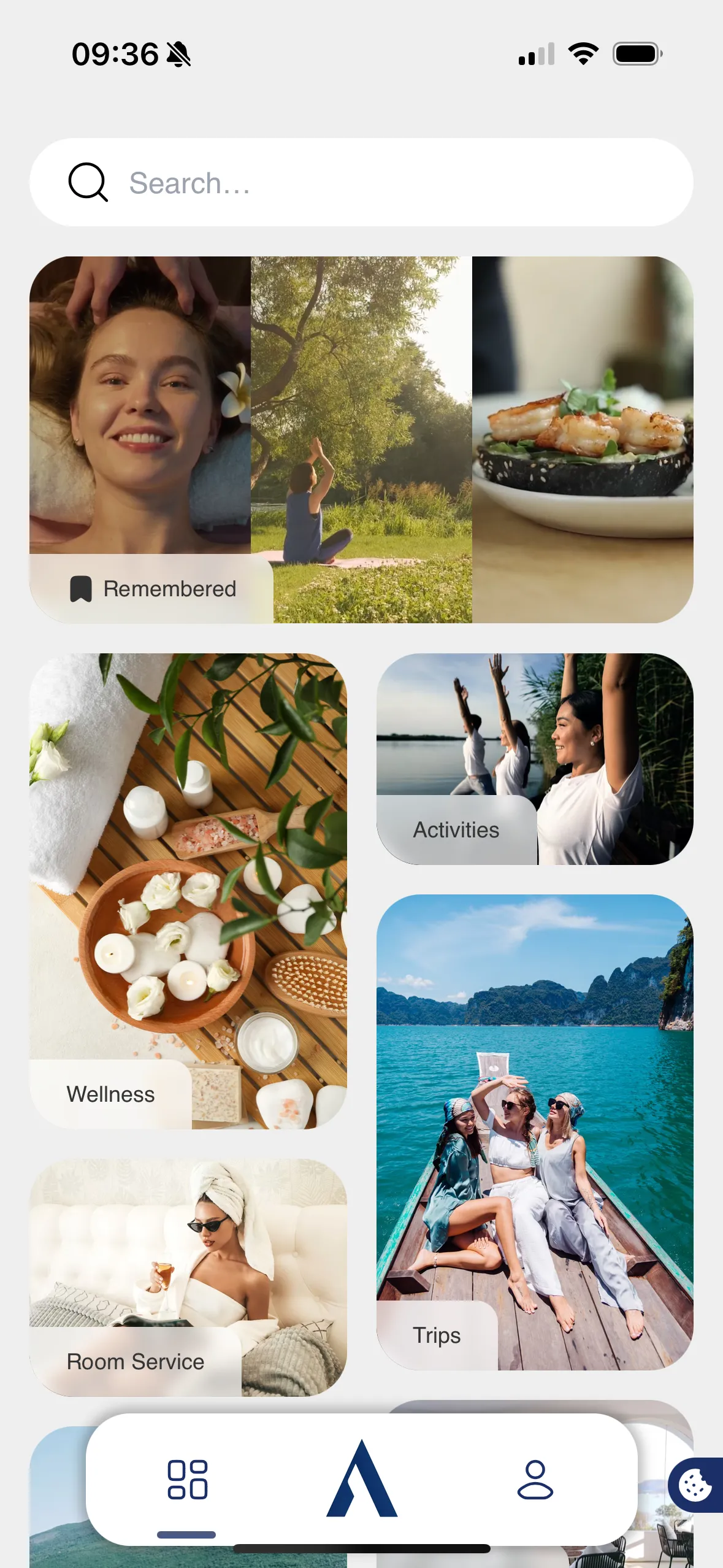
3. Overcoming Sales Barriers
Say Goodbye to Outdated Sales Methods
Static offers or banners are often overlooked. An effect called banner blindness. The reason: our brain filters out "advertising" elements to get to relevant information faster. Interactive, simple stimuli perceived as helpful gain attention instead.
Hotel Upselling That Works
Actively place your hotel specials and premium offers in guests' field of vision; for example, with an explanatory video that immediately shows the benefit. Instead of classic advertising, your offer works like a credible expert tip.
Make Booking Easy
The more complex the booking process, the lower the conversion rate. The Baymard Institute shows: by fixing checkout barriers, shops can increase their conversion by +35%. The complexity of form fields is more decisive than the number of steps.
Reduce Sales Barriers and Increase Guest Satisfaction
Make the booking path as simple as possible: web app instead of app download, clear navigation, few clicks, easy reservation management. If the process feels natural, booking probability increases significantly.
Use Personalization and Expertise
People trust experts, especially when recommendations come personally. Chefs, sommeliers, or spa directors lend credibility to offers because competence becomes visible. Cialdini describes this as the authority principle: titles, experience, and expertise increase persuasive power. Combined with personalization, the recommendation doesn't feel like advertising but like good advice.
Use Team Skills Effectively
Put your team in the spotlight. Use your team's expertise and likeable nature to create sales arguments and build relationships with your guests.
3 Problems from Hotel Operations & How Guest Activation Solves Them
Premium Experiences Aren't Booked
- Problem: Premium offers like hot stone massage, private tasting, or sunset tour remain unbooked.
- Possible reasons: Higher prices require more security; texts and images don't build enough trust.
- Activation: At the right time, a short video appears in the GoodieFeed from the responsible expert: the spa director, sommelier, or guide. In 10-15 seconds, they make the benefit tangible ("deeply relax in 25 minutes") and show what guests can concretely expect. Directly below are available slots with one-click booking, complemented by social proof elements like "Popular with couples."
Restaurant Capacity Underused
- Problem: Restaurant or bar is half full.
- Possible reasons: Guests don't know the best time slots; positive incentives are missing.
- Activation: The chef shows the evening's signature dish in a 10-second video. The bartender invites to happy hour with his special cocktail. Countdowns subtly highlight the actions so it's clear: the offer is limited.
Time-Critical Offers Are Missed
- Problem: Infusions start, morning yoga is missed, happy hour ends with too few guests.
- Possible reasons: Static notices, missed email timing, no visual urgency.
- Activation: The GoodieFeed plays the offer at the right time. Morning yoga appears the day before, infusions are announced in time ("Starting in 45 minutes"). When capacity is tight, the additional service is reinforced by the impulse "Only 3 spots left."
Boost Hotel Revenue: 3-Step Plan for Successful Guest Activation
Step 1: Define Your "Aha-Moment"
What feeling should your guests associate with your hotel? Deep relaxation? Adventure or perhaps a touch of luxury? Consider how this feeling becomes visible in GuestGoodie: from the calm massage scene to the personal invitation to the golf taster course. The GoodieFeed doesn't just perfectly showcase your experiences, but also you and your team. Guests should feel from the beginning what added value your hotel offers.
Step 2: Showcase Your Hotel
Which experiences should guests absolutely not miss? Spa rituals, culinary highlights, or local insider tips? You don't need to be a video pro to evoke emotions: authenticity beats perfection. Short vertical videos from you or your team are better than any stock image. Explain in a few sentences what makes the experience special and personally invite them. Subtitles are useful for every video because autoplay often runs without sound.
- The optimal feed for increasing hotel revenue: Stick to the 80/20 rule. Those who only sell get ignored. Free tips and genuine insider hints ("The five most beautiful viewpoints for sunset") build trust and show your accommodation's value. This creates a coherent mix of offers, events, recommendations, and short messages that ultimately motivate purchase.
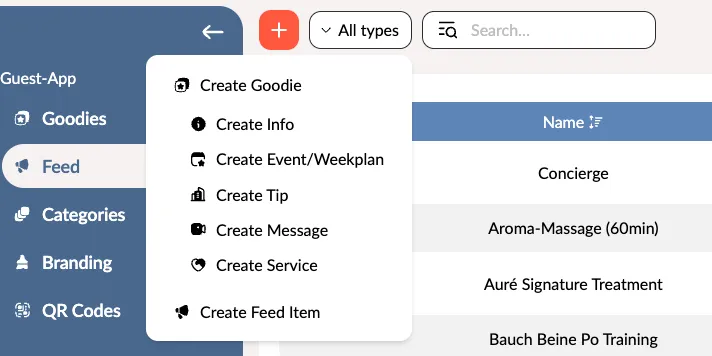
Step 3: Motivate Your Guests
When are your guests most receptive? After check-in? Before dinner? Or after the excursion? Offers can be played in the GoodieFeed at different times so the web app always seems dynamic and your offers work most effectively. Using psychological sales impulses like scarcity or social proof, you motivate your guests to experience and enjoy more.
- Note: Use psychological impulses thoughtfully so they always provide added value to your guests. A natural flow should emerge from "interested" to "book now" without pressure and without deception. Artificial scarcity or inappropriate social proof labels seem irritating and harm the experience. Not every offer is a "bestseller" – and that's okay. What matters is that guests feel what's right for them right now.
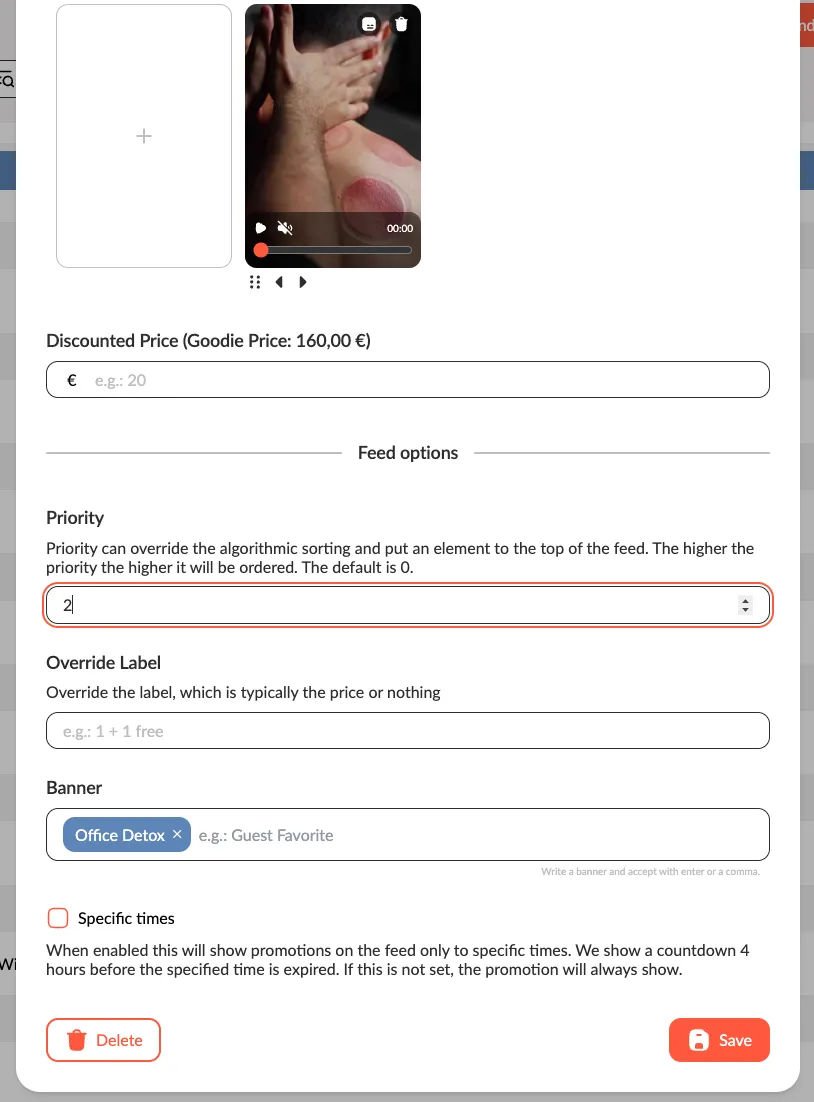
Why Now Is the Time for Guest Activation
Digital Guest Service Without Losing Charm
66% of hotel guests prefer self-service options, yet they want to feel welcome. Guest Activation connects both: GuestGoodie delivers immediately usable comfort and creates closeness through authentic team videos. This creates what classic hotel apps rarely achieve: digital efficiency with genuine hospitality.
Staff Shortage Demands Efficiency
Recurring questions are answered in the hotel web app, add-on bookings succeed with one click, and demand is actively managed (e.g., "quiet slot at 6:00 PM"). Your team gains time for what only humans can do: individual advice, genuine recommendations, and creating special moments for guests.
The Science Is Established
What behavioral research has shown for years works in hospitality: video beats text or images, social proof reduces decision risk, and familiar usage patterns increase conversions. Guest Activation translates these principles into a simple flow that increases your hotel revenue.
An Honest Look: What Guest Activation Is Not
Guest Activation is not a miracle cure, but a method that works with consistency. It unfolds its effect when actively implemented in hotel operations: an empty bar becomes an invitation for a sundowner; a rainy afternoon becomes a recommendation for cake and tea in the hotel lounge.
The principle: Create aha-moment → Increase motivation → Trigger action.
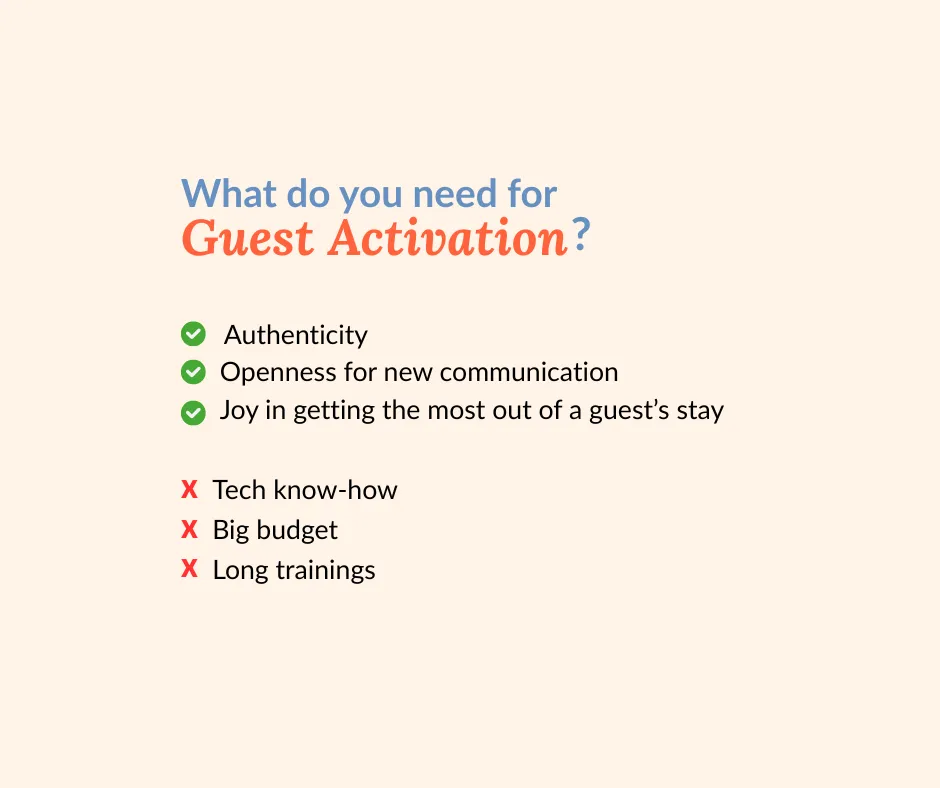
What it doesn't replace: Guest Activation doesn't replace personal service. It brings your charm into the digital world. Your team remains the credible voice that recommends and invites; the Guest Activation app makes it accessible to every guest, regardless of where they are or how stressful the day is for your team. This creates exactly what modern guests expect: digitally convenient, humanly warm.
Conclusion: From Passive Guest Service to Guest Activation
Modern guests expect more than digital convenience: they want to be inspired, feel understood, and book without barriers. Classic hotel apps often get stuck in the information role. Guest Activation addresses exactly where impact occurs: at the aha-moment, motivation, and simple action. This way, offers aren't just seen, but experienced.
3 Insights for Your Hotel
- Sales impulses instead of information overload: Sales psychology reduces decision burden and increases conversion rates.
- Video creates trust and anticipation: Authentic short videos make benefits tangible and lower booking barriers.
- Simplicity wins: Web app, clear paths, one-click booking. The smoother the process, the higher the booking chance.
Frequently Asked Questions:
What is Guest Activation in Hotels?
Guest Activation is the evolution of classic hotel apps and digital guest directories. Instead of overwhelming guests with information, targeted impulses are created to motivate guests to book additional services.
What Role Does Psychology Play in Guest Activation?
Sales psychology is the foundation of Guest Activation. Studies show:
- Videos increase conversion rates by up to 86%
- Social proof measurably increases booking rates
- Scarcity and urgency can increase conversions by up to 300%
This means for your hotel: emotional impulses replace rational information. Guests decide faster and with better feelings. This increases hotel revenue and improves the guest experience.
Does Guest Activation Replace Personal Guest Service?
No. Guest Activation digitally complements your team's hospitality. Your sommelier, spa manager, or bartender remains the credible voice; short videos make their expertise visible and build relationships with your guests. This creates digital efficiency with personal charm.
Sources